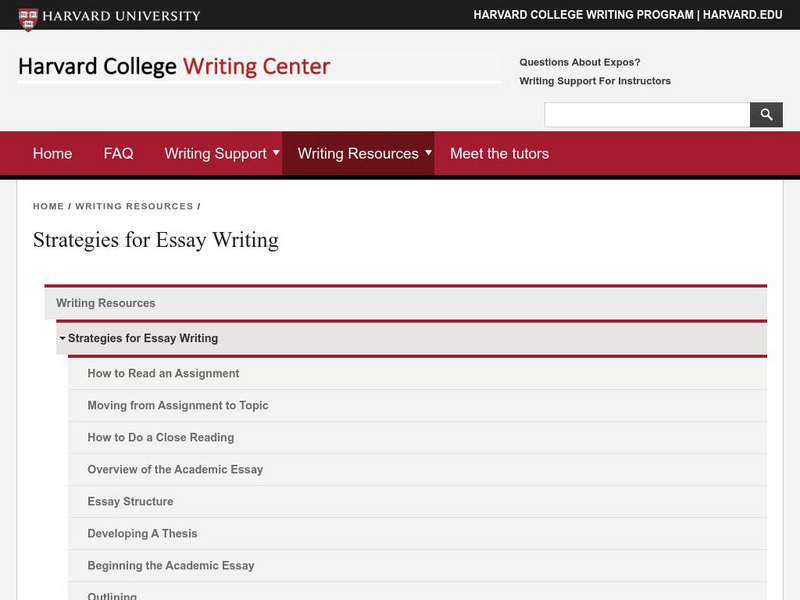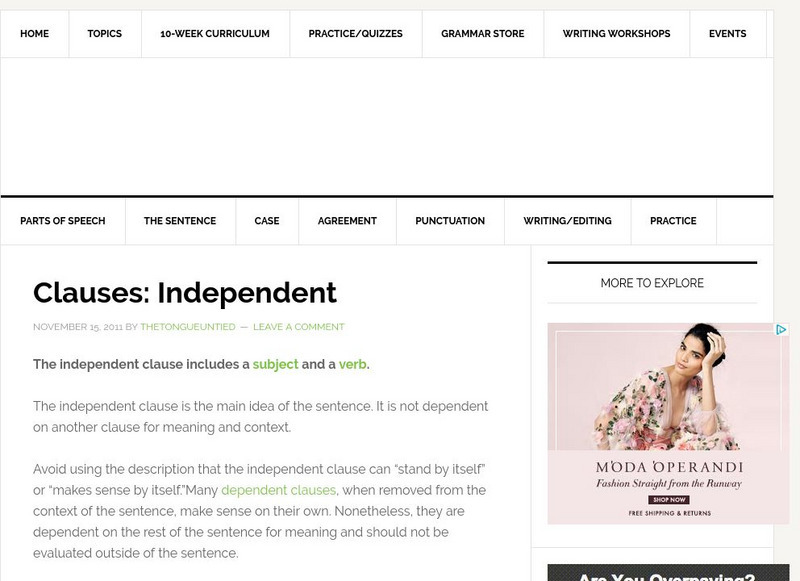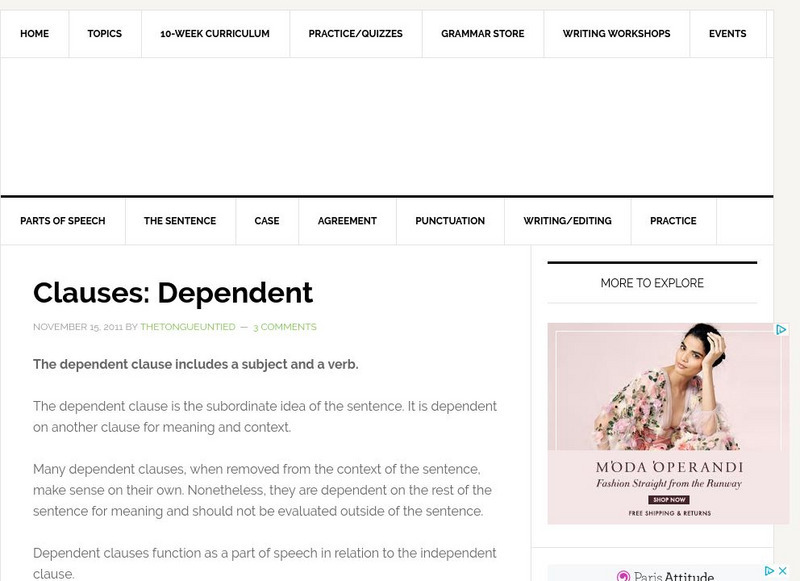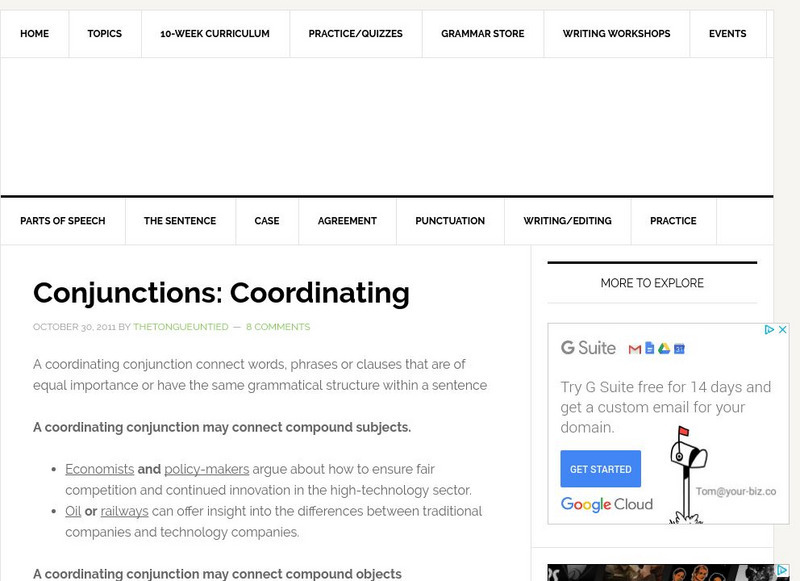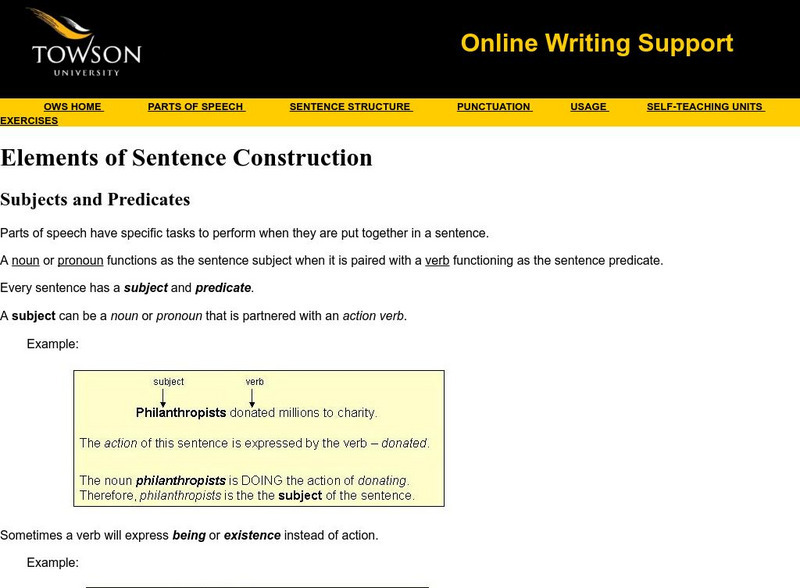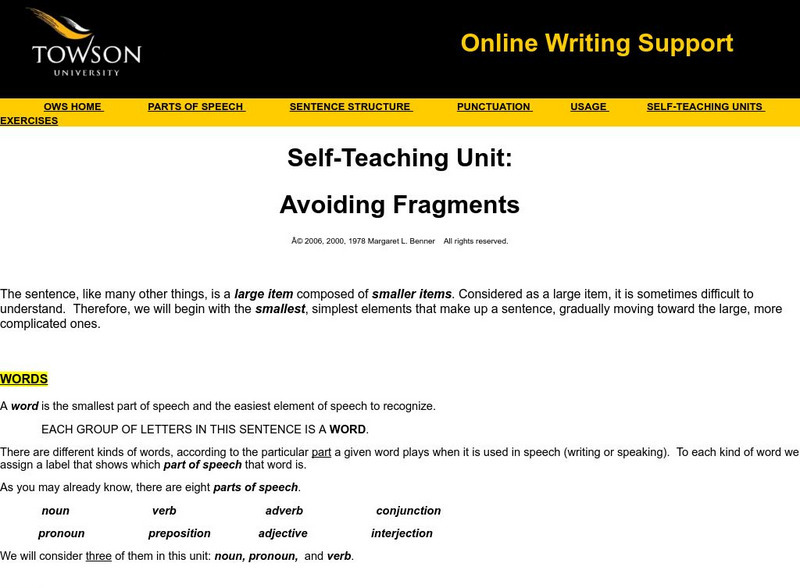National Endowment for the Humanities
Lesson 2: The Debate in Congress on the Sedition Act
Pupils research and discuss the provisions in the Constitution that supported the arguments for and against the Sedition Act. They articulate objections to and arguments in favor of the Sedition Act.
ClassFlow
Class Flow: Equivalent Sentences
[Free Registration/Login Required] This flipchart is designed to teach students how to analyze sentences for equivalency. It also provides skills in paraphrasing. There is an assessment using Activotes and a lesson summary.
Sophia Learning
Sophia: Transition Words
This tutorial focuses on transition words. In text it defines transition words and how they improve writing; in PDF it provides a list of transition words and phrases by category with examples. Using a PowerPoint presentation, it...
University of North Carolina
University of North Carolina: Writing Center: Handouts: Evidence
What kinds of evidence best support the points you make in a paper? Where can you find the evidence you need? This handout answers all these questions and more, including the difference between primary and secondary sources. You'll also...
Harvard University
Harvard University: Strategies for Essay Writing
This website provides a series of links to detailed information about each segment of how to write an academic essay from how to read the assignment to the final edits. Use the links to the right. W.9-10.1a claims/intro/org, W.9-10.2a...
Texas Education Agency
Texas Gateway: Restrictive & Nonrestrictive Clauses & Punctuation
[Accessible by TX Educators. Free Registration/Login Required] This lesson will teach you to identify a restrictive relative clause, also known as an essential clause, and a nonrestrictive relative clause, also known as a nonessential...
Texas Education Agency
Texas Gateway: Understanding and Analysis of Literary Text: Syntax
A learning module that teaches students about syntax in six mini-lessons: Introduction, What is Syntax?, The Building Blocks of Syntax-Clauses and Phrases, Adding on-Figures of Speech, and Your Turn.
The Tongue Untied
The Tongue Untied: Independent Clause
The Tongue Untied is a guide to grammar, punctuation, and style for journalists, and it has great information on the independent clause. The site provides numerous examples along with information on usage and tips for recognizing...
The Tongue Untied
The Tongue Untied: Dependent Clause
The Tongue Untied is a guide to grammar, punctuation, and style for journalists, and it has great information on the dependent clause. The site provides numerous examples along with information on usage and tips for recognizing dependent...
Capital Community College Foundation
Guide to Grammar and Writing: Cause and Effect
Capital Community College gives excellent overview, assistance, and examples of using cause and effect in writing and composition.
The Tongue Untied
The Tongue Untied: Conjunctions
Maintained by the University of Oregon School of Journalism and Communications, this site offers a good definition and numerous examples of coordinating conjunctions. Also has hyperlinks to sections on subordinating conjunctions,...
The Tongue Untied
The Tongue Untied: Clauses: The Basics
This page, from a site for University of Oregon journalism students, provides definitions of a clause, an independent clause, and a dependent clause as well as some brief instructions on their uses. The page seems to contain some...
City University of New York
Writesite: Clauses
Grammar and writing tutorial defines clause, independent clause, and dependent clause and provides exercises.
Towson University
Towson University: Ows: Dependent Clauses: Adverbial, Adjectival, Nominal
This entry defines dependent clauses including Adverbial, Adjectival, and Nominal; explains and lists their common introductory words, and provides examples of their uses in sentences.
Towson University
Towson University: Online Writing Support: Elements of Sentence Construction
This entry focuses on the Elements of Sentence Construction including subjects and predicates, phrases and clauses, compound sentence elements, and avoiding fragments, run-ons, and fused sentences.
Towson University
Towson University:online Writing Support: Self Teaching Unit: Avoiding Fragments
This module focuses on what makes a sentence including parts of speech, subjects and predicates, and phrases and clauses. It then explains fragments and how to avoid them. It offers links to several exercises and a post-quiz.
Towson University
Towson University: Distinguishing Between Adverbials and Adjectivals
This is a 20-question, self-grading quiz/exercise on Distinguishing between Adverbials and Adjectivals.
Towson University
Towson University: Distinguish Between Adverbials and Adjectivals Exercise 2
This is a 20-question, self-grading quiz/exercise on Distinguishing between Adverbials and Adjectivals.
Towson University
Towson University: Distinguish Between Adverbials and Adjectivals Exercise 3
This is a 20-question, self-grading quiz/exercise on Distinguishing between Adverbials and Adjectivals.
Towson University
Towson University: Distinguishing Between Adverbials and Adjectivals Exercise 4
This is a 20-question, self-grading quiz/exercise on Distinguishing between Adverbials and Adjectivals.
Towson University
Towson University: Distinguishing Between Adverbials and Adjectivals Exercise 5
This is a 20-question, self-grading quiz/exercise on Distinguishing between Adverbials and Adjectivals.
Towson University
Towson University: Distinguishing Between Adverbials, Adjectivals, and Nominals
This is a 20-question, self-grading quiz/exercise on Distinguishing between Adverbials, Adjectivals, and Nominals.
Towson University
Towson University: Distinguishing Adverbials, Adjectivals, Nominals Exercise 2
This is a 20-question, self-grading quiz/exercise on Distinguishing between Adverbials, Adjectivals, and Nominals.
Towson University
Towson University: Distinguishing Adverbials, Adjectivals, Nominals Exercise 3
This is a 20-question, self-grading quiz/exercise on Distinguishing between Adverbials, Adjectivals, and Nominals.






